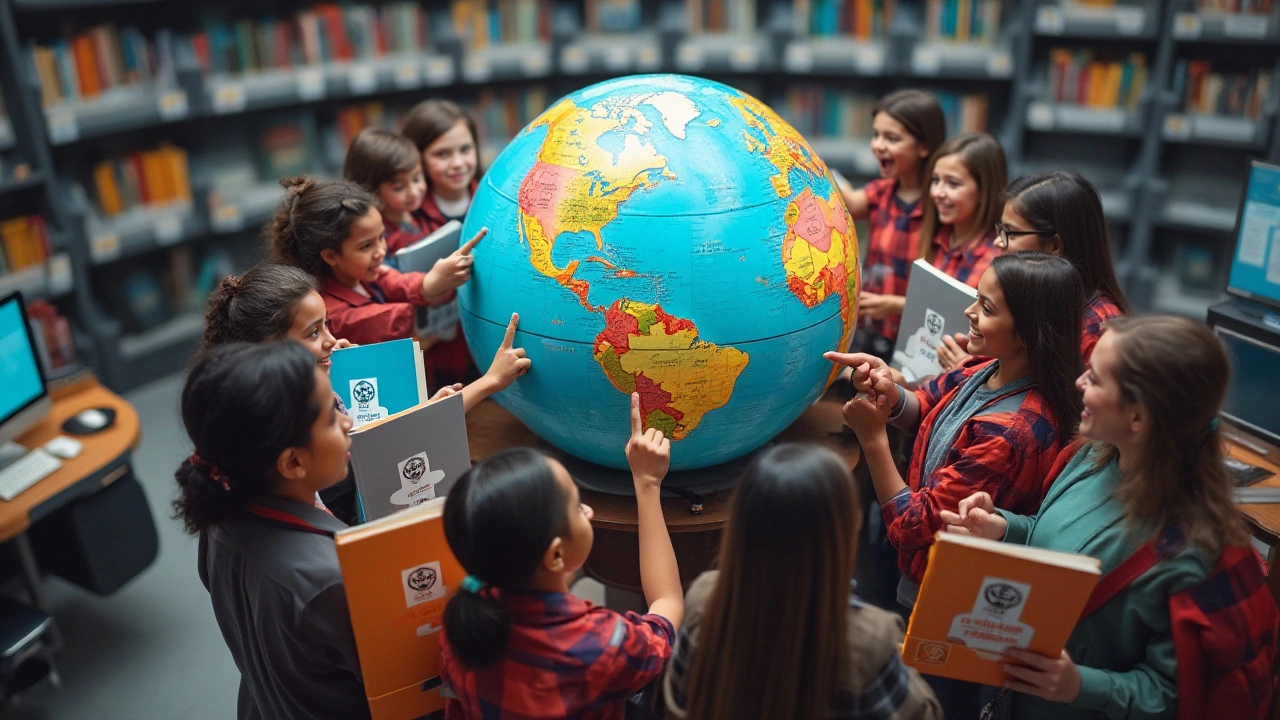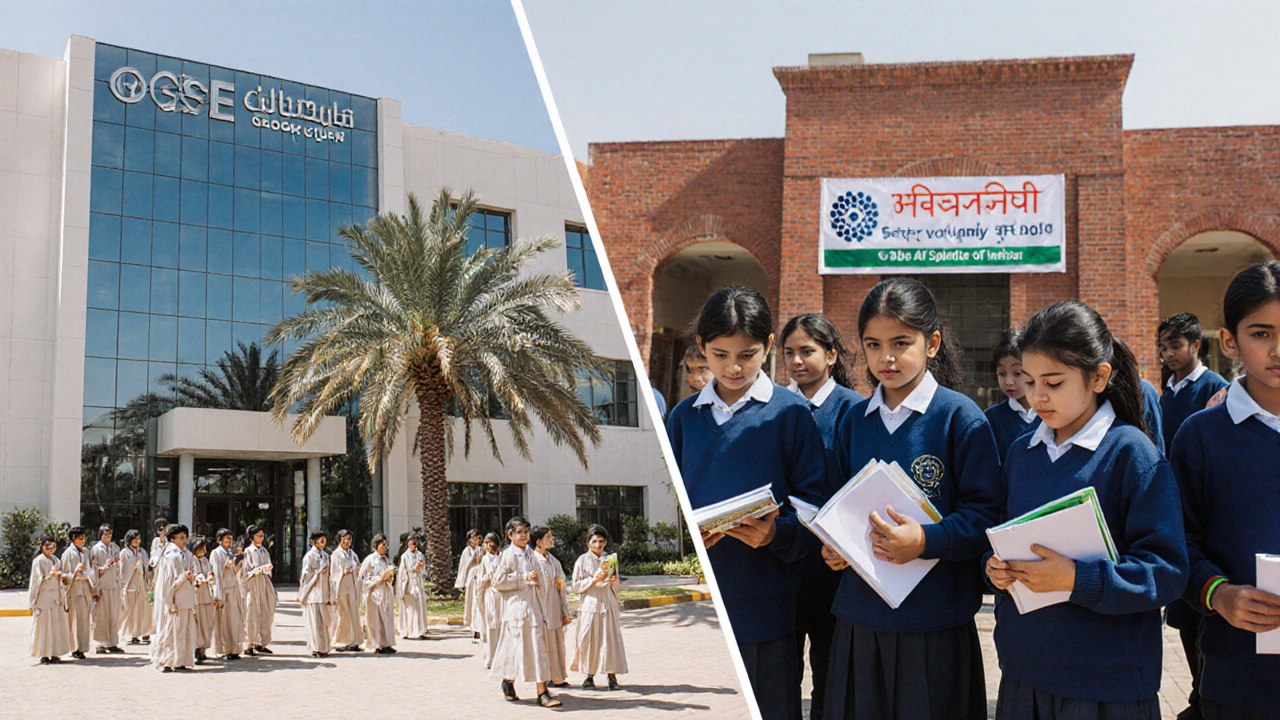The Central Board of Secondary Education (CBSE), a prominent educational board in India, has made its mark worldwide. This curriculum, renowned for its standardized and holistic approach, transcends the borders of India, catering to students across various nations.
With its roots deeply planted in Indian educational traditions, CBSE provides a global learning experience that resonates with expatriates and international learners alike. It offers a consistent educational standard, which is especially beneficial in regions with a dynamic student demographic.
Exploring the diffusion of CBSE globally reveals both its influence and the challenges encountered. Whether you're considering enrollment in an international CBSE school or simply curious about its worldwide impact, you'll discover valuable insights about its educational opportunities and global reach.
- Introduction to CBSE and its Global Presence
- Countries with CBSE Institutions
- Benefits of CBSE Abroad
- Challenges Faced by International CBSE Schools
- How to Enroll in CBSE Schools Overseas
- Future of CBSE on the Global Stage
Introduction to CBSE and its Global Presence
The CBSE syllabus, headquartered in India, has grown substantially over the years, marking its footprints across the globe. As one of India's leading educational boards, CBSE provides a structured and well-thought-out curriculum that incorporates both academic and non-academic elements. Its reputation for cultivating high standards in education started back in the 1920s, but it was in the mid-20th century that it began to standardize its approach, making it flexible yet effective for diverse student communities. Today, schools affiliated with CBSE extend beyond Indian borders, revealing its appeal to a global audience.
CBSE’s international presence is largely attributed to the burgeoning Indian diaspora that seeks continuity in education amidst relocations. The board’s strong framework minimizes disruptions that expatriates, diplomats, and Non-Resident Indians might otherwise face. Interestingly, over 200 schools in about 25 countries operate under the CBSE banner. Nations like the United Arab Emirates, Singapore, and Nepal showcase a significant cluster of international CBSE schools, paving the way for a global educational exchange. This cross-border acceptance appeals not only to expatriates but to locals in those countries, offering a unique amalgamation of eastern and western educational tenets.
According to CBSE, a fundamental aspect of their global outreach is the assimilation of local cultures and educational demands. "Education can't be a one-size-fits-all approach," reports Dr. Rajesh Kumar Chaturvedi, former chairperson of CBSE.
Our commitment at CBSE is to nurture students through a global curriculum while respecting local customs and needs, ensuring our education remains inclusive and comprehensive.This core value has propelled CBSE's strategy to adapt sensibly in different regions, balancing global standards with localized content.
The adaptability of the CBSE global presence further manifests in its partnerships with international educational bodies. These collaborations help schools implementing the CBSE curriculum to offer a blended learning experience enriched with global best practices. CBSE’s alignment with international assessment patterns and its introduction of vocational education modules reflect its dynamism and readiness to evolve. It is this global alignment that positions CBSE as a preferred choice for many, adapting to the ever-changing educational landscape.
But why this unprecedented growth abroad, you ask? It's primarily due to CBSE’s cost-effectiveness without compromising on quality, offering value-added education at a fraction of what many other international boards require. The ease of English as its primary language of instruction further strengthens its appeal in non-Hindi speaking countries. Data suggests that around 70% of Indian students abroad choose CBSE-affiliated schools due to familiar syllabi that ensure a seamless transition should they return to India.
Thus, CBSE's international expansion is not just about physical schools existing outside India but is a testament to an evolving educational philosophy. It stands on the cusp of being an interwoven narrative, embodying cultural diversity and academic excellence. As education policies shift towards a more global outlook, the role CBSE plays in reflecting this change is significant, poised for even further expansion and influence worldwide.
Countries with CBSE Institutions
The spread of the CBSE syllabus beyond India's borders reflects the globalized nature of education today. As the Indian diaspora expanded, so did the demand for a familiar educational framework for children abroad. Countries like the United Arab Emirates, Singapore, and Malaysia have embraced the CBSE curriculum in numerous schools, catering not only to Indian expatriates but also to locals interested in an alternative educational approach.
In the United Arab Emirates, for instance, there exists a significant number of schools adopting the CBSE curriculum, mainly due to a large Indian community. The demand is so high that new institutions open regularly, ensuring that students there receive the same level of educational quality as their counterparts in India. One fascinating aspect is how CBSE schools in the UAE integrate local culture and language studies while maintaining the core standards of the Indian curriculum.
Other Popular Regions
Schools in Singapore and Malaysia are also popular among parents seeking CBSE education for their children. In Singapore, several schools have adopted the curriculum, and they are renowned for their high academic standards and extracurricular offerings. Singapore’s strategic importance as an educational hub means that CBSE schools there serve a diverse community, attracting students from various nationalities. Similarly, Malaysia hosts a number of CBSE schools, primarily in urban centers, and these institutions play a crucial role in offering Indian education seriously outside India.
"Having CBSE schools abroad is a boon for the Indian community as it keeps children connected to their educational roots," says Anurag Singhal, an education consultant in Dubai.
Apart from these widely recognized regions, several other countries, including Oman, Qatar, Saudi Arabia, and Kuwait, feature CBSE schools as an integral part of their diverse educational systems. Each of these countries shows substantial enrollment numbers, showcasing the curriculum's appeal due to its structured approach, emphasis on skill development, and alignment with competitive exams like IIT-JEE and NEET.
Table below lists some countries with CBSE institutions along with info about the average number of schools:
| Country | Approx. CBSE Schools |
|---|---|
| UAE | 70+ |
| Singapore | 10+ |
| Malaysia | 5+ |
| Oman | 15+ |
| Qatar | 15+ |
These schools support the global perception of the CBSE curriculum, demonstrating its adaptability and acceptance in diverse educational landscapes. They not only facilitate seamless transitions for students returning to India but also reinforce the reputation of Indian education abroad. The key takeaway here is the CBSE's capability to offer a consistent and competitive education that aligns with international standards, making it a favored choice worldwide.

Benefits of CBSE Abroad
When considering education systems, the CBSE syllabus stands out for its emphasis on holistic development and rigorous academic standards. One of the greatest benefits of CBSE abroad is its international recognition, providing an excellent platform for students to thrive in competitive global environments. The curriculum's structure ensures continuity for Indian expatriates, minimizing disruptions that are common when families relocate. For students, this means a smooth educational journey from one country to another without compromising their learning. This continuity is crucial for maintaining educational consistency, ensuring that students do not fall behind their peers.
The spread of the CBSE syllabus beyond India has fostered a diverse educational landscape, blending local cultural elements with internationally recognized academic standards. Students in international CBSE schools gain a unique perspective, learning alongside peers from diverse backgrounds. This exposure plays a key role in developing empathy and cross-cultural understanding, equipping students with valuable skills needed in today’s interconnected world. The competitive exams and assessments provided by CBSE groom students for excellence, giving them an edge when applying to prestigious universities globally. It has been documented that CBSE alumni perform exceptionally well in entrance exams for medical and engineering fields, which are highly regarded worldwide.
Moreover, the CBSE global presence is indicative of its flexible yet structured approach, which is highly adaptable to different educational expectations across countries. It provides students with opportunities to participate in a wide range of extracurricular activities and co-scholastic pursuits. The emphasis on physical education, arts, and moral education ensures the growth of well-rounded individuals. Within the CBSE framework, students often engage in innovative learning practices that encourage critical thinking and problem-solving. This approach not only enhances their academic capabilities but also prepares them for real-world challenges.
Parents often prefer CBSE for its strong foundational skills in mathematics and sciences, coupled with robust language instruction. The practical application of these subjects helps in scaffolding knowledge that students can build on as they advance in their educational and professional careers. Additionally, CBSE's linguistic diversity, offering several major languages as part of its syllabus, helps foster a polyglot culture, essential in our globalized world.
Benjamin Smith, a renowned education consultant, stated,
"CBSE's approach effectively harmonizes traditional erudition with 21st-century skills, creating versatile and competitive graduates who are poised for success both academically and professionally."The validation from such esteemed professionals highlights the board's impact on shaping the academic and personal futures of its students.
Challenges Faced by International CBSE Schools
Bringing the CBSE syllabus beyond Indian borders comes with a unique set of hurdles that schools around the world must overcome. One significant challenge is the adaptation to different cultural contexts. Although the curriculum is standardized, the way it's taught might need modifications to align with local cultural norms and expectations. Teachers are often required to be culturally sensitive yet capable of maintaining the integrity of the Indian curriculum, which can demand extensive professional development and training. Language barriers can pose another major issue, particularly in countries where English is not the primary language of instruction. This necessitates hiring educators proficient in both the local language and English, which can be a resource-intensive process.
Administrative challenges in setting up CBSE schools internationally should not be underestimated either. Complying with diverse education policies and regulations in host countries can be daunting for school administrators. There's often a need for negotiation with local educational authorities to obtain necessary accreditations and approvals, which can vary significantly from one country to another. Additionally, resource allocation for importing educational materials and managing technological infrastructure in different geographical locations adds to operational complexities. Another significant issue is the adjustment of school calendars to accommodate both Indian and local holidays, which sometimes results in a fragmented school year.
The economic ramifications of establishing and maintaining CBSE schools abroad can't be ignored. High operational costs, coupled with potentially limited student populations, can affect the financial viability of these schools. Variations in currency exchange rates further complicate budget planning and fiscal predictability. Schools often rely on the expatriate Indian community for student enrollment, which in some areas might not be substantial enough to sustain the institution. This necessitates broadening the target demographic to include non-Indian students, which can pose marketing and integration challenges.
Despite these obstacles, the global spread of the CBSE syllabus reflects its appeal. However, the complexity of meeting expectations from diverse educational stakeholders remains. According to a report by the International Education Research Center, "CBSE schools abroad need to be equipped not just academically but also culturally to ensure a holistic education that bridges Indian traditions with international standards." This sentiment underscores the balancing act these institutions must perform, navigating between maintaining the prestigious Indian education standard while also adapting to the global stage.

How to Enroll in CBSE Schools Overseas
Taking the leap to enroll your child in a CBSE school abroad can be a life-changing decision with countless benefits. The path, though defined, involves essential steps to ensure a smooth transition. Begin with identifying CBSE affiliated schools in your desired country, a process that can be facilitated through the official CBSE website or through embassies that often keep an updated list provided by the Indian Ministry of Education. Research is key here; schools might vary widely in terms of facilities, extracurricular offerings, and fee structures, so it’s beneficial to have a clear picture of what each institution offers.
Once you have shortlisted potential schools, it's crucial to consult with the school's administration. Many international CBSE schools offer orientations where prospective students and parents can understand curricula specifics and participate in Q&A sessions. It is vital to understand the enrollment requirements as they might differ from those in India, often incorporating country-specific education policies. This can include documentation like academic transcripts, birth certificate, and valid passport copies. Some schools might require an entrance test or interview to assess the student's academic preparedness and English proficiency, which should be agreed upon beforehand to prevent surprises during the process.
A significant challenge can be navigating the eligibility criteria, which often involves proving the applicant's willingness and ability to adapt to a new educational environment. Here, the role of portfolio presentation can be game-changer, including achievements, certificates, and personal interests of the student. The importance of a good recommendation letter from previous teachers can’t be overstated, often helping to solidify a student’s position amidst competition. Upon acceptance, arranging for visa documentation support from the institution can be invaluable, ensuring that the transition is as smooth as possible legally.
An exemplary quote from Dr. Harsh Mehta, a respected educational consultant, comes to mind:
"Choosing a CBSE school abroad is about more than academics; it's about ensuring your child fits into a nurturing environment that aligns with cultural values despite the geographical distance."Once the admission is confirmed, parents should engage with expatriate communities or Indian cultural clubs locally as these groups can provide support networks, rich in information and experience-sharing opportunities, contributing significantly to both the parents’ and the student’s adjustment process.
Be aware of the potential financial commitment. Not only should you consider tuition fees but also additional costs such as uniform, transport, and extracurricular activities. Many CBSE schools abroad sometimes differ in their fee payment structures, offering annual, semester-based, or monthly installment plans. An often overlooked yet crucial step is to understand the school's refund policy in case a change of plans is necessary. With these steps managed prudently, enrolling in a CBSE school overseas can lead to a seamless and enriching educational journey for your child.
| Document | Requirement |
|---|---|
| Academic Transcripts | Certified copies needed |
| Recommendation Letters | At least two |
| Passport Copy | Valid at least six months |
| English Proficiency Test | If required by the school |
Future of CBSE on the Global Stage
The Central Board of Secondary Education (CBSE) has seen significant growth beyond India's borders over the years. As the demand for quality education systems transcends boundaries, CBSE's presence in international markets has become a testament to its adaptability and comprehensive curriculum. The future of CBSE on the global stage seems promising, with several countries already embracing the CBSE syllabus. This sets a consistent standard in education for Indian expatriate families and international students seeking rigorous academic frameworks. There's a growing perception that CBSE can equip students with the skills needed to thrive in a globalized world, thanks to its focus not only on theoretical knowledge but also on practical applications and critical thinking skills.
The ability of CBSE to stay relevant and align with global educational trends involves continuous modernization of the curriculum, incorporating newer subjects and methodologies that reflect the rapidly changing world. Education trends suggest an increase in STEM-focused curriculums, and CBSE actively integrates this need by updating its syllabus to include recent developments in science and technology fields. An important aspect of its future growth is how the board plans to introduce programs focused on digital learning and sustainable education, recognizing the importance of technology and environmental awareness in modern education systems.
Several CBSE schools outside India report a steady annual increase in enrollment, demonstrating the board's appeal. Information from the last five years shows a positive trend where international students opt for CBSE schools, driven by the need for a cohesive educational standard before transitioning to higher studies. According to an educational conference held in 2023, "The rise of globally recognized boards like CBSE signifies an educational paradigm shift, where borders are increasingly blurring, and quality education is prioritized."
The effectiveness and efficiency of the CBSE system in adapting to changing educational needs have significantly contributed to its acceptance worldwide, expanding opportunities for students globally to partake in such a rigorous and well-rounded academic structure.
Countries like Singapore, the UAE, and many African nations have embraced CBSE curriculum models in their schools, aligning them to meet local needs while maintaining international standards. As global societies become more interconnected, there's a notable shift towards incorporating diverse educational models that cater to multicultural populations. By continuing to collaborate with educational authorities globally, CBSE fosters local engagement and ensures its framework benefits indigenous and expatriate students alike. This adaptability enriches their learning experience, enabling them to be effective global citizens.
Looking ahead, CBSE aims to broaden its impact by participating in more international academic collaborations and enhancing its networks across continents. This strategic expansion will likely lead to increased recognition and respect for the international CBSE schools, fortifying their place within the international education landscape. The adaptability and quality of the CBSE system underscore its potential to address educational disparities, thereby offering students from different cultural backgrounds a chance to achieve their academic aspirations in a structured, globally-oriented environment.



